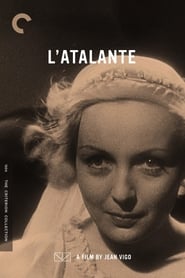Things happen which under the banality — and the thinness — of this story, and their very realisation reveals the fundamental error of confusing the ordinary with the unremarkable, entertainment with eventfulness.[…]
Like the genre of Greek and medieval romance, the film refuses to segregate serious and comic matters, high style and low, the physical and the metaphysical, the apparent and the inward.
[…]
L'Atalante would be a different film under a different name — if it were called, for instance, 'La Louis XVI', which was the actual name of the barge hired for the filming. Apart from having a supple, graceful shape, the word 'L'Atalante' is feminine in gender, which helps define the dominant place of struggle in the film.
[…]
L'Atalante is a study of eros, and at certain moments a memorably erotic film; not through the spectacle of touch — what a caress or kiss looks like — so much as its continual attention to the effects of contact. The after-images left by tactile pleasure or pain — affect that takes place to the side of the action — behave like hyphens, lying in-between one act of contact and another. There is some remarkable punctuation of this kind in the narrative throughout the film.
[…]
Juliette embodies radiantly the femme-enfant idealised by André Breton and the [surrealist] movement, the innocent vehicle through whom men could reach greater knowledge, more intense pleasure. She fulfils the definition of 'La Femme' proposed in Le Dictionnaire abrégłe du surrłéalisme [1938], in which Breton paraphrased Baudelaire: 'Woman is the being who projects the greatest light or the greatest shadow into our dreams. [Indeed,] Dita Parlo is a femme-enfant, but her inner world matters more even than her outer appeal. She is, as James Agee noted, 'the fullest embodiment of sub-articulate sex that I have seen'. In his perceptive eulogy of L'Atalante, Agee then went on to point to a most telling association: 'Michel Simon, as a pre-mental old man, is even more wonderfully realised as a poetic figure, a twentieth-century Caliban.' Agee puts his finger here on Dita Parlo's childishness, her Miranda-like qualities of discovery and innocence and acceptance.
[…]
Gilles Margaritis's performance as the camelot draws on all the exuberance and energy of popular entertainment, of the boulevards, of vaudeville, of café conc' singing. He adds light and wit and fun and caddish dazzle to the already rich mix of moods in L'Atalante, and rising up so vigorously and so animatedly into the middle of the movie, he springs a surprise that rounds out the film's patterns of enchantment. The audience cannot resist this genie peddling pleasure any more than Juliette can; in terms of the fairy-tale structure, he functions as the adversary, a wily seducer who must be resisted if the lovers are to flourish.
[…]
[Vigo] does not have a chance, given the romance he is telling, to counter with his usual anarchic contrariness the prevailing moral arguments about the dangers for women [in straying]. These have been shown [to] lie as much in male anxiety about the freedom cities and work could offer women as in the actual hazards that faced them.
[…]
[And then finally we see] a fresh, airborne view of 'L'Atalante' sailing up the screen. The camera holds the barge's ascent for a moment, then flies on ahead, and overtakes it; the image fills with the emptiness of opaque water, speckled with light, and then travels on, as if soaring. The shot itself feels like an elixir of life. [The] water is the symbol of time, of the future — the element in which the beloved can be seen with the eyes of a true lover, a blankness and a fullness at once, the dreaming subject over which the camera can take flight.
— Marina Warner: BFI Film Classics: L'Atalante (1993)
Vigo would fill the spare structure [of the screenplay] with a muted anarchist sensibility (via an almost casually carefree approach to mise-en-scène and suggestive erotic imagery) that, unlike Zero [for Conduct, 1933], truly counts as subversive.[…]
Along with the dissolve of sexual signifiers, Vigo also conveys a certain motif that even within the anarchy of life there is a sense of inevitability.
— Eric Henderson (Slant Magazine)
When I first saw the new version at the Toronto film festival last fall, I was struck by what seemed to be the film’s bisexuality — not a bisexual program of any sort, but a treatment of the characters’ sexuality that goes beyond the usual heterosexual norms and definitions.[…]
One of [Jules' cats] scratches Jean’s cheek when he first steps aboard after the wedding, and soon afterward Jean is furious when a litter of kittens is born in his and Juliette’s bed — two signals at the outset that Jules and what he represents threaten the sexual health and privacy of the couple, even if it’s Jules who ultimately succeeds in reuniting them at the end.
— Jonathan Rosenbaum (Chicago Reader)

